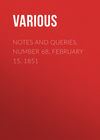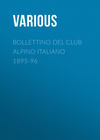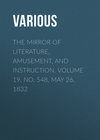Читать книгу: «Notes and Queries, Number 68, February 15, 1851», страница 3
Queries
FIVE QUERIES AND NOTES ON BOOKS, MEN, AND AUTHORS
1. Newburgh Hamilton.—Can any of your readers inform me who Newburgh Hamilton was? He wrote two pieces in my library, viz. (1.) Petticoat Plotter, a farce in two acts; acted at Drury Lane and Lincoln's Inn Fields, London, 1720, 12mo. This has been mutilated by Henry Ward, a York comedian, and actually printed by him as his own production, in the collection of plays and poems going under his name, published in 1745, 8vo., a copy of which I purchased at Nassau's sale, many years since. (2.) The Doating Lovers, or the Libertine Tamed, a comedy in five acts; acted in Lincoln's Inn Fields. It is dedicated to the Duchess of Hamilton and Brandon, whose "elegant taste and nice judgment in the most polite entertainments of the age," as well as her "piercing wit," are eulogised. Accident gave me a copy of Mr. Hamilton's book-plate, which consists of the crest and motto of the ducal race of Hamilton in a very curious framework,—the top being a row of music-books, whilst the sides and bottom are decorated with musical instruments, indicative, probably, of the tastes of Mr. Hamilton.
2. The Children's Petition.—I have also a very extraordinary little book, of which I never saw another copy. It formerly belonged to Michael Lort, and is entitled
"The Children's Petition, or a Modest Remonstrance of that Intolerable Grievance our Youth lie under, in the accustomed Severities of the School Discipline of this Nation. Humbly presented to the Consideration of the Parliament. Licensed Nov. 10. 1669, by Roger L'Estrange. London, 1669. 18mo."
The object of this most singular production is to put down the flagellation of boys in that particular part of the body wherein honour is said to be placed; and the arguments adduced are not very easily answered. The author, whoever he was, had reason, as well as learning, on his side. I am not aware of any other copy north the Tweed; but there may be copies in some of the libraries south of that river.
3. Dr. Anthony Horneck.—Do any of the letters of the once celebrated Dr. Anthony Horneck exist in any library, public or private? His only daughter married Mr. Barneveldt; and his son, who served with Marlborough, left issue, which failed in the male line, but still exists in the female line, in the representative of Henry William Bunting, Esq., the caricaturist. The writer of these Queries is the direct descendant of Mrs. Barneveldt, and is anxious to know whether any unpublished MSS. of his ancestors still exist. There was a Philip Horneck who in 1709 published an ode inscribed to his excellency the Earl of Wharton, wherein he is described as LL.B., a copy of which I have. There can be no doubt he is the individual introduced by Pope in the Dunciad, book iii. line 152.; but what I wish to know is, whether he was a son of Dr. Horneck, and a brother of the general.
4. In Clifford's History of the Paul of Tixall, the name of the real author of Gaudentio di Lucca is given. Every reliance may be attached to the accuracy of the information there given, not only on account of the undoubted respectability of the author, but from the evident means of knowledge which he, as a Roman Catholic of distinction, must have had.
5. The Travels of Baron Munchausen were written to ridicule Bruce, the Abyssinian traveller, whose adventures were at the time deemed fictitious. Bruce was a most upright, honest man, and recorded nothing but what he had seen; nevertheless, as is always the case, a host of detractors buzzed about him, and he was so much vexed at the impeachment of his veracity, that he let them get their own way. Munchausen, a veritable name—the real possessor of which died in October, 1817—was assumed, and poor Bruce was travestied very cleverly, but most unjustly. The real author has not been ascertained; but at one time it was believed to have been James Grahame, afterwards a Scotch barrister, and author of a poem of much beauty, called The Sabbath. Circumstances which came to my knowledge, coupled with the exceedingly loveable character of Grahame, render this belief now incredible; but undoubtedly he knew who the real author was. The copy in my library is in two volumes: the first, said to be the second edition, "considerably enlarged, and ornamented with twenty explanatory engravings from original designs," is entitled Gulliver Revived: or the Vice of Lying properly exposed, and was printed for the Kearsleys, at London, 1793. The second volume is called A Sequel to the Adventures of Baron Munchausen, and is described as "a new edition, with twenty capital copperplates, including the Baron's portrait; humbly dedicated to Mr. Bruce, the Abyssinian traveller," was published by H. D. Symonds, Paternoster Row, 1796. I had for years sought for an original copy of this very singular work, and I at last was so successful as to purchase the one above described, which had been picked up by a bookseller at the sale of some books originally forming part of the library at Hoddam Castle.
On looking over a copy of Sir John Mandeville,
"Printed for J. Osborne, near Dockhead, Southwark; and James Hodges, at the Looking Glass, on London Bridge:"
I observe he gives—at least there—no account whatever of his peregrinations to the polar regions; and the notion of ascribing to him the story of the frozen words is preposterous. I have not in my library, but have read, the best edition of Sir John's Travels (I don't mean the abominable reprint), but I do not remember anything of the kind there. Indeed Sir John, like Marco Polo, was perfectly honest, though some of their informants may not have been so.
J. Me.
Minor Queries
The Witches' Prayer.—Can you inform me where I can find the epigram alluded to by Addison, in No. 61. of the Spectator, as "The Witches' Prayer," which falls into verse either way, only that it reads "cursing" one way, and "blessing" the other? Or is the epigram only a creation of the pleasing author's fertile imagination?
Doubtful.
St. John's Wood.
Water-buckets given to Sheriffs.—Can any of your readers inform me the origin of the delivery of water-buckets, glazed and painted with the city arms, given to the sheriffs of London and Middlesex at the expiration of the year of their shrievalty?
J. B. K.
Temple.
A Cracow Pike.—Can any of your readers tell me what a Cracow pike is? I have searched Meyrick's works on Ancient Armour without finding any notice of such a weapon; but as those works have no indexes one cannot be certain that there may not be some mention of it. I shall be obliged by a description of the Cracow pike, or a reference to any authorities mentioning it, or its use.
I. H. T.
Meaning of Waste Book.—Can you or any of your readers inform me the origin of the term used in book-keeping, viz., "Waste" book?
I am the book-keeper and cashier in an extensive firm, and I know there is very little wasted that goes into our books bearing that name.
One who often runs for the Great Ledger.
Machell's MS. Collections for Westmoreland and Cumberland.—In the library of the dean and chapter at Carlisle, are preserved six volumes in folio, which purport to be Collections for the History of Westmoreland and Cumberland, made in the Reign of Charles II., by the Reverend Thomas Machell. Have these collections been carefully examined, and their contents made use of in any topographical publication?
Edward F. Rimbault.
Decking Churches at Christmas.—Does the custom of dressing the churches at Christmas with holly, and other evergreens, prevail in any country besides England?
L.
Coinage of Germany.—I should wish to be referred to the names of the principal works on the coinage of Germany; not merely the imperial, but that of sovereign prelates, abbeys, &c., that struck money.
A. N.
Titles of Peers who are Bishops (Vol. iii., p. 23.).—Why is Lord Crewe always called so, and not Bishop of Durham, considering his spiritual precedency? Was not Lord Bristol (who was an Earl) always called Bishop of Derry?
Cx.
At Sixes and Sevens.—Shakspeare uses the well-known adage—"at sixes and sevens;" Bacon, Hudibras, Arbuthnot, Swift, all use the proverb. Why should sixes and sevens be more congruous with disorder than "twos and threes?" and whence comes the saying?
D. C.
Shaking Hands.—What is the origin of the custom of shaking hands in token of friendship? And were the clasped hands (now the common symbol of Benefit Clubs) ever used as a signet, prior to their adoption as such by the early Christians in their wedding rings; or, did these rings bear any other motto, or posy, than "Fides annulus castus" (i. e. simplex et sine gemmâ)?
J. Sansom.
George Steevens.—Can any of your readers inform me whether a memoir of George Steevens, the Shakspearian commentator, ever was published? Of course I have seen the biographical sketch in the Gentleman's Magazine, the paragraph in Nichols' Anecdotes, and many like incidental notices. Steevens, who died in January, 1800, left the bulk of his property to his cousin, Miss Elizabeth Steevens, of Poplar; and as there is no reservation nor special bequest in the will, I presume she took possession of his books and manuscripts. The books were sold by auction; but what has become of the manuscripts?
A. Z.
Extradition.—The discussion which was occasioned, some time ago, by the sudden transference of the word extradition into our diplomatic phraseology, must be still in the recollection of your readers. Some were opposed to this change on the ground that extradition is not English; others justified its adoption, for the very reason that we have no corresponding term for it; and one gentleman resolved the question by urging that, "si le mot n'est pas Anglais, il mérite de l'être." I believe there is no reference in "Notes and Queries" to this controversy; nor do I now refer to it with any intention of reviving discussion on a point which seems to have been set at rest by the acquiescence of public opinion. I wish merely to put one or two Queries, which have been suggested to me by the fact that extradition is now generally employed as an English word.
1. Is there any contingency in which the meaning of the word extradition may not be sufficiently expressed by the verb to deliver up, or the substantive restitution?
2. If so, how has its place been supplied heretofore in our diplomatic correspondence?
Henry H. Breen.
St. Lucia, Dec. 1850.
Singing of Metrical Psalms and Hymns in Churches.—1. When and how did the custom of singing metrical psalms and hymns in churches originate? 2. By what authority was it sanctioned? 3. At what parts of the service were these psalms and hymns directed to be introduced? 4. Was this custom contemplated by the compilers of the Book of Common Prayer?
Arun.
Ormonde Portraits.—I shall feel much obliged by information on the following points:—
1. Whether any portrait of Thomas Earl of Ormonde has been published? He died in the year 1614.
2. How many engraved portraits of Thomas, the famous Lord Ossory, have been issued? their dates, and the engravers' names.
3. How many engraved portraits of the first and second Dukes of Ormonde, respectively, have appeared? their dates, and engravers' names.
James Graves.
Kilkenny, Jan. 31. 1851.
Tradescant.—In the inscription on the tomb of the Tradescants in Lambeth churchyard, which it is proposed to restore as soon as possible, these two lines occur:
"These famous antiquarians, that had been
Both gardeners to the Rose and Lily queen."
Can any of your readers inform me when the elder Tradescant came over to England, and when he was appointed royal gardener? Was it not in the reign of Elizabeth?
J. C. B.
Lambeth.
Arthur's Seat and Salisbury Craigs.—L. M. M. R. is very anxious to be informed as to the origin of the name of Arthur's Seat and Salisbury Craigs, the well-known hill and rocks close to Edinburgh.
Lincoln Missal.—Is a manuscript of the missal, according to the use of the church of Lincoln, known to exist? and, if so, where may it be seen?
Edward Peacock, Jun.
Покупайте книги и получайте бонусы в Литрес, Читай-городе и Буквоеде.
Участвовать в бонусной программе




















